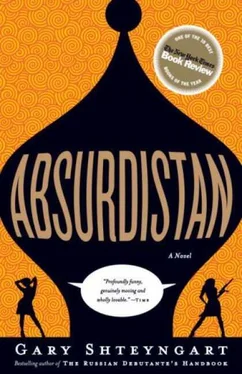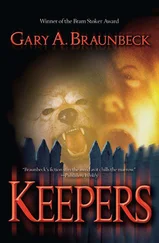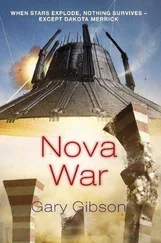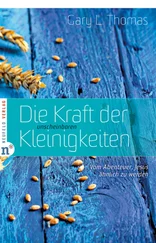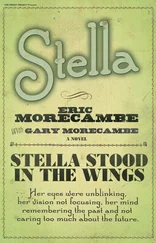“This is what I’m talkin’ about,” Rouenna said, looking around, breathing it all in. “South Bronx. Fort Apache. Morrisania. Fuckin’ A, Misha. And you’re saying these just average folks?”
“I guess,” I said. “I don’t talk to the common people much, really. They look at me like I’m some kind of freak. In New York, when I get on the subway and homeys see my size, they give me respect.”
“That’s ’cause you look like a rap star,” Rouenna said, kissing me.
“That’s ’cause I am a rap star,” I said, licking her lips.
“Behave yourself in a cultured manner,” a passing babushka spat at us.
* * *
Rouenna was no stranger to violent death, so when Papa was blown up on the Palace Bridge, she knew how to be tough and not let me fall into further melancholy. “You gotta ‘snap, crackle, pop’ out of this,” she told me, holding me forcefully by my lower chin and snapping the fingers of her other hand.
“Like the American Rice Krispies cereal,” I said, smiling. “ ‘Snap! Crackle! Pop!’”
“What I just say? Did you call your shrinkie-doodle-doo?”
“He’s at a psychiatric conference in Rio all month.”
“Now, what do you pay that asshole for? All right, spudster. I’m gonna have to fix you up myself. Take ’em off. Show me what you got for mommy.”
I unzipped my Puma tracksuit, letting everything spill out in short order. I got down on the Mies van der Rohe daybed, assuming my analytic position with difficulty. Because my neck is so fatty, I suffer from terrible sleep apnea—impossibly loud snoring, constant shortness of breath. It gets worse when I lie on my back, so when Rouenna sleeps next to me, she instinctively pushes me over on the side with one of her muscular thighs, and I instinctively marshal my fat into an unconscious rollover. A night camera would probably capture something like a postmodern underwater ballet.
“Flip,” Rouenna said. I got down on my stomach. “Thatta boy.”
She laid her hands on what I call my “toxic hump,” a black molten peak of stilled flesh and bad circulation, a monument to inactivity grown during the two years of my Russian exile, the repository of all my anger, a kind of anti-heart on the back of me that keeps the sadness pumping. As Rouenna began to knead and contour the intractable hump with her thick fingers, I began to warble in humility and delight: “Oh, Rowie. Don’t leave me. Oh, Rowie. Oh, lovey. Don’t go.”
The sadness poured out of my toxic hump and flooded the far-flung veins buried like transatlantic cables across my body. I recalled my mommy’s tear-stained face after she lost me at the Yalta train station one summer and thought the dastardly Gypsies had kidnapped and eaten me. “I would have killed myself if something had happened to you,” Mommy said. “I would have thrown myself off the cliff of the Sparrow’s Nest.” Of course, Mommy lied to me constantly, the way mothers in terrible societies do to keep their children from needlessly suffering. But I knew she was telling the truth just then. She would have killed herself. Her life was contingent upon mine. A nine-year-old child, I briefly foresaw my parents’ deaths—cancer ward, a ball of flame—and buried the knowledge deep in my then-tiny gut.
“You’re not breathing right, honey,” Rouenna said. The idea of my impending loneliness had formed a chicken bone in my throat. I was slowly losing oxygen. “Do like me,” Rouenna said. She inhaled slowly, held the air in, then released it all over my left ear. The heavy incidence of sour cream and butter in the Russian diet had added a new dimension to her breath. Her breasts, tied back with a kind of wide summer bandanna, were a reassuring presence against the toxic hump and the warm, sweaty flesh that gathered around it like the foothills of Mount Etna.
“I love you so much,” I said. “I love you with everything I have.”
“I love you, too,” Rouenna said. “You’ll get through this all right, baby. You gotta have faith.”
Faith was one of Rouenna’s specialties. Her family’s tiny duplex on Vyse and 173rd in the Bronx fairly burst with olive-skinned ceramic Madonnas nursing sweet baby Jesuses, just as the fifteen reproductive women of the extended household gave sustenance to their newborn Felicias and Romeros and Clydes, everywhere breast milk and obeisance and quiet American devastation. In the late seventies, when Rouenna was a toddler, their apartment building in Morrisania had been torched for insurance purposes. One afternoon a threatening anonymous note was slipped under their door, and by evening “finishers” came to strip their apartment of its electrical wiring and plumbing fixtures. Rouenna’s mom draped her with a blanket to protect her from the winter cold, and by nightfall their building joined the parade of torches lighting up the northern bend of the Harlem River. Fortified by the quiet submission of the poor, they trooped over to a homeless shelter that had been recommended to them by other relatives in similar circumstances. Eventually some Methodists won their trust by feeding them. They found her mother a job sweeping city streets, and one of the younger, more mobile grandmothers was set up selling sweet ices on a street corner (the men of the household had long since fled). The Methodists helped them fill out applications for the new government housing that was then slowly revitalizing the Bronx. By the nineties, Rouenna’s family had climbed into the ranks of the lower middle class, their meager but ever-growing worldly goods racing ahead of their obliterated urban psychologies. And then I came along, the “rich Russian uncle sent by God” who had taken such interest in their daughter’s development. Little did they know who was saving whom.
“I know you’re all heartbroken over your daddy,” Rouenna said as she worked the hump, “but I gotta say, he didn’t do right by you.”
“He didn’t love me enough?” I asked.
“He drags your ass to Russia, then he kills the Oklahoma dude, and now you can’t leave. My family may be fucked up, but at least we look out for each other. When I told my moms you was Jewish, not Methodist, she was like, ‘Long as he treat you good.’”
“It’s different in Russia,” I said, kissing one of Rouenna’s hands, which was cradled beneath my chin. “Here a child is just an extension of his parents. We’re not allowed to think or act differently from them. Everything we do is to make them proud and happy.”
“Whatever,” Rouenna said. “Why don’t you just do what makes you proud and happy and let your dead father rest already?”
“You know what that would be, sweetie?” I asked.
“You wanna bust a nut in me?”
“I want to do some laundry.”
Like all Jewish boys growing up in Russia, I’d had all of my earthly needs (save one) taken care of by my mother, but after Rouenna moved into my gargantuan Financial District loft, she exposed me to a new experience—the Laundromat. At first I insisted that a professional laundress wash our socks and underwear, but Rouenna taught me there was something simple, methodical, and pleasing about doing it yourself. She taught me all about temperatures and detergents and how to treat “delicates.” After the drying machine stopped spinning, we would roll up our socks together. She would make perfect little balls out of the socks, and when we got home, it was such a pleasure to unroll them and put on a warm fresh pair. I’ll always associate self-laundered socks with democracy and the primacy of the middle class.
I took Rouenna down to the cellar. A laundry was already in progress. My manservant, Timofey, was supervising a young new maid as she sorted through my tracksuits and loincloth-style underwear. “Yes, that’s how we do it here,” Timofey was saying to the maid, nodding sagely. “That’s just how the master likes it. What a good girl you are, Lara Ivanovna.”
Читать дальше
